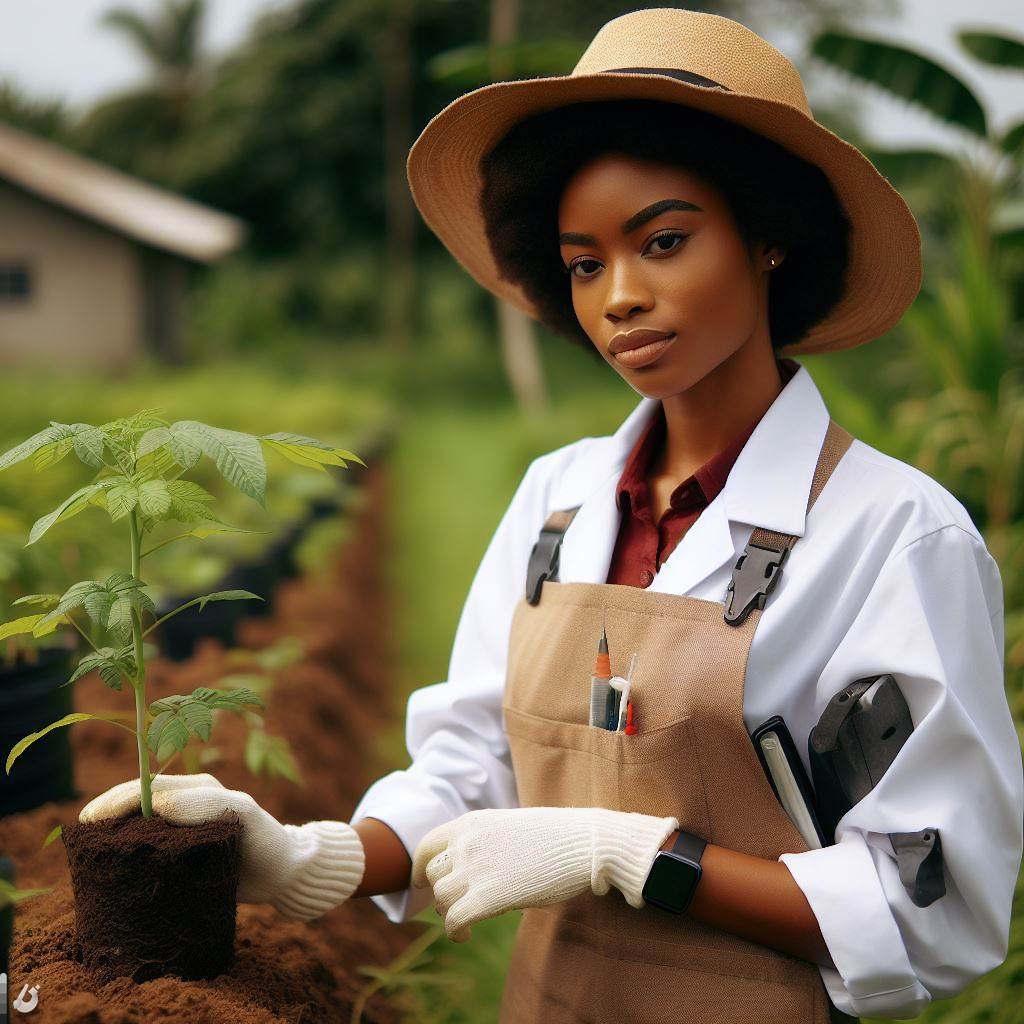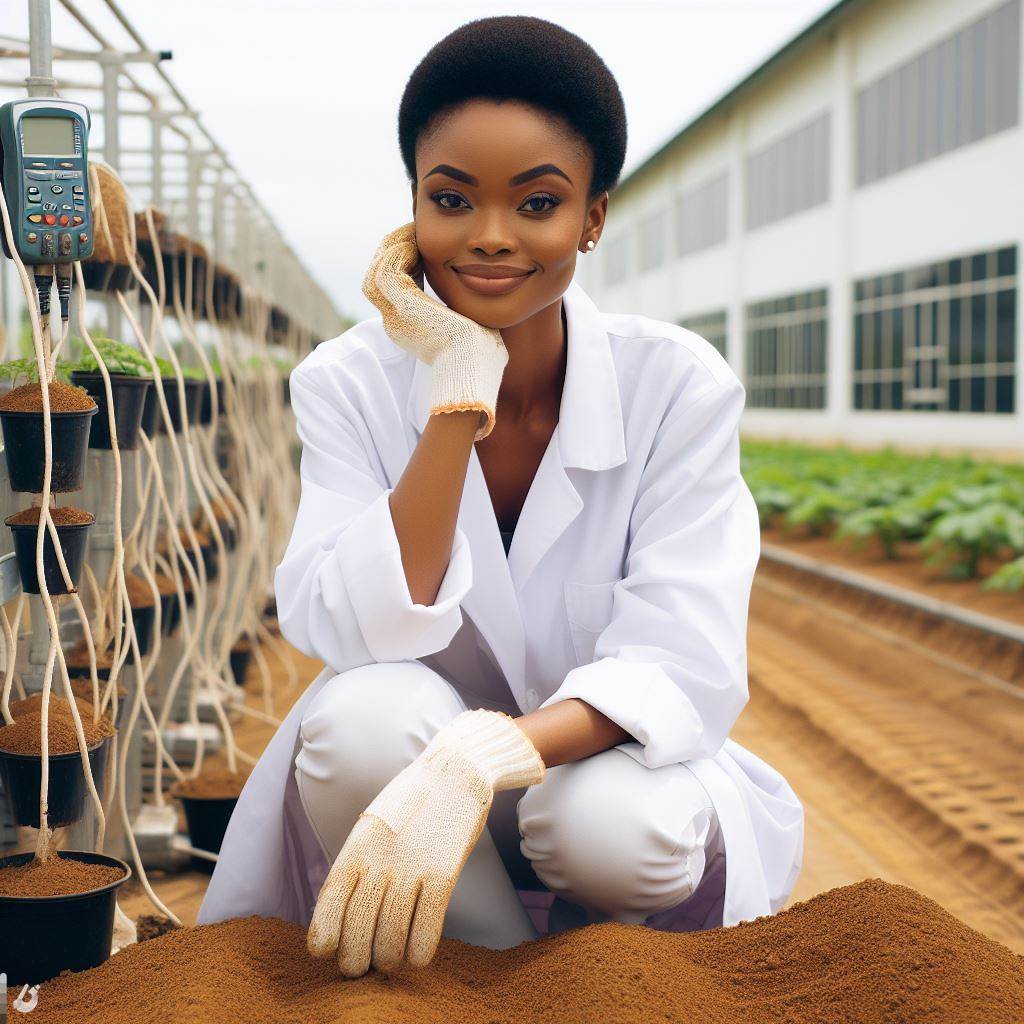Introduction
Tradition refers to long-established customs, beliefs, and practices passed down from generation to generation.
On the other hand, modernity represents the current trends, advancements, and technologies shaping our society.
In the context of crop production in Nigeria, it is important to find a balance and synergy between tradition and modernity.
Crop production is a vital component of Nigeria’s agricultural sector, providing food and income to a substantial portion of the population.
Traditional methods of cultivation have served the country well for centuries, but the rapidly changing world demands adaptation and innovation.
Connecting tradition and modernity in crop production brings numerous benefits.
Traditional knowledge and practices can be enhanced by incorporating modern technologies and scientific advancements.
This synergy allows for increased productivity, improved crop quality, and reduced environmental impact.
Furthermore, bridging tradition and modernity in crop production creates opportunities for economic growth and development.
By incorporating modern techniques, farmers can access larger markets, increase their income, and contribute to the overall prosperity of the country.
However, this connection must be approached mindfully.
It is crucial to ensure that modernization does not lead to the abandonment of traditional wisdom and practices that have proven to be effective for generations.
Instead, tradition should serve as a foundation, guiding the adoption of modern methods.
In essence, the intertwining of tradition and modernity in crop production is essential for Nigeria’s agricultural sector to thrive.
By embracing innovation while respecting traditional practices, Nigeria can sustainably meet the challenges of the present and future, ensuring food security, economic growth, and environmental sustainability.
Traditional Practices in Crop Production
Overview of traditional methods used in crop production
In Nigeria, traditional methods play a crucial role in crop production, connecting the country’s rich history with modern practices.
These traditional methods have been passed down from one generation to another, ensuring the sustainability and productivity of crop farming.
1. Organic farming
Traditional farmers in Nigeria rely on organic farming techniques, avoiding the use of chemical fertilizers and pesticides.
Instead, they use natural sources like animal manure and compost to enrich the soil and promote healthy plant growth.
2. Rotational farming
Another important traditional method in crop production is rotational farming.
Farmers alternate the cultivation of different crops in the same field to restore soil fertility and prevent the depletion of nutrients.
This practice contributes to sustainable and efficient use of land.
3. Water conservation
Traditional farmers in Nigeria have mastered the art of water conservation in crop production.
They construct irrigation channels and dams to store water during the rainy season and use it for irrigation during dry spells.
This method ensures continuous crop production even in times of limited rainfall.
Traditional farming techniques and their significance
Traditional farming techniques have stood the test of time and continue to be relevant in Nigeria’s crop production.
These techniques have significant advantages and contribute to sustainable agriculture.
1. Intercropping
Intercropping involves growing different crops in close proximity on the same piece of land.
This practice maximizes the use of space and increases crop yield.
Additionally, intercropping helps control pests and diseases, as different plants act as natural repellents to specific pests.
2. Crop rotation
Crop rotation is a traditional farming technique that involves growing different crops successively in the same field.
This method prevents the build-up of pests and diseases, reduces soil erosion, and improves soil fertility. It also helps break pest life cycles and maintains soil health.
3. Agroforestry
Agroforestry is a traditional practice that combines the cultivation of crops with the planting of trees.
Trees provide shade, prevent soil erosion, and enhance biodiversity.
Agroforestry systems also contribute to climate change mitigation by sequestering carbon dioxide.
Examples of traditional crops grown in Nigeria
Nigeria has a diverse range of traditional crops that have been cultivated for centuries, showcasing the connection between tradition and modernity in crop production.
1. Yam
Yam holds great cultural importance in Nigeria, and traditional farming methods are still employed to grow this staple crop.
It is high in carbohydrates and essential nutrients, making it an integral part of Nigerian cuisine.
2. Cassava
Cassava is a highly versatile and important traditional crop in Nigeria.
It is used to make various food products, such as garri (a popular staple food), fufu, and tapioca.
Transform Your Career with Expert Guidance
Get personalized mentorship consulting that’s tailored to your unique path. Our expert advice is actionable and exclusive.
Get StartedCassava farming is a significant source of income for many rural communities.
3. Millet
Millet is a drought-tolerant crop that has been grown in Nigeria for generations.
It is used to make a variety of local dishes and is well adapted to the country’s climate, making it an important traditional crop.
In fact, traditional practices in crop production in Nigeria demonstrate the harmonious connection between tradition and modernity.
These practices not only ensure sustainable agriculture but also contribute to food security, cultural preservation, and the conservation of natural resources.
Embracing and integrating traditional methods with modern technologies can lead to a more resilient and productive agricultural sector in Nigeria.
Read: Why Crop Protection is Vital for Nigeria’s Economy
Modern Approaches to Crop Production
Introduction to modern agricultural techniques
In recent years, Nigeria has recognized the need to embrace modern agricultural techniques in order to increase crop production and meet the growing demands of its population.
These modern approaches leverage advanced technologies and innovative practices to enhance productivity and sustainability in the agricultural sector.
Traditional farming methods in Nigeria have relied heavily on manual labor and outdated tools and equipment.
However, with the advent of modern agricultural techniques, farmers now have access to a wide array of tools, machinery, and technologies that have revolutionized crop production.
Benefits of modern agricultural practices in Nigeria
The adoption of modern agricultural practices in Nigeria has resulted in numerous benefits for farmers and the overall agricultural sector.
Firstly, these practices have significantly increased the yields of various crops, allowing farmers to produce more food and meet the rising demand.
This has contributed to food security and reduced the country’s dependence on imports.
Modern agricultural practices also help in conserving natural resources such as water and soil.
Through the use of precision irrigation techniques, farmers can efficiently water their crops, minimizing water wastage and ensuring optimal plant growth.
Additionally, advanced soil testing and management tools allow farmers to make informed decisions about fertilization, thus reducing the overall environmental impact.
Moreover, modern agricultural techniques have improved the quality of crops produced in Nigeria.
With the use of technology-driven processes, farmers can monitor and control various factors such as temperature, humidity, and nutrient levels, leading to enhanced crop quality and consistency.
Examples of modern crops and technologies used in Nigeria
Nigeria has embraced modern crops and technologies to boost agricultural productivity.
One such example is the cultivation of hybrid maize.
Hybrid maize varieties have higher yield potentials and are more resistant to diseases and pests, ensuring a better harvest for farmers.
Another modern crop is the improved rice variety called Nerica, which is a hybrid of African and Asian rice.
Nerica has a higher yield potential, shorter growth duration, and greater tolerance to adverse weather conditions, making it a valuable addition to Nigeria’s rice production.
In addition to modern crops, advanced technologies are being employed in Nigerian agriculture.
For instance, precision agriculture techniques such as remote sensing and geographic information systems (GIS) are utilized to monitor crop health, detect nutrient deficiencies, and predict yield potential.
These technologies allow farmers to make precise decisions regarding fertilization, irrigation, and pest control, leading to efficient resource utilization and increased productivity.
Furthermore, the use of modern machinery such as tractors, combine harvesters, and planters has significantly improved the efficiency and effectiveness of crop production in Nigeria.
These machines not only reduce dependence on manual labor but also ensure timely and accurate farm operations, resulting in higher yields and reduced post-harvest losses.
In short, the adoption of modern agricultural techniques in Nigeria has brought about substantial improvements in crop production.
These techniques have increased yields, enhanced crop quality, conserved natural resources, and made farming more efficient.
By continuing to embrace modern approaches, Nigeria can further strengthen its agricultural sector and achieve sustainable food production for its growing population.
Read: Challenges and Solutions: Crop Production Education in Nigeria

Challenges in Integrating Tradition and Modernity
Obstacles faced in adopting modern agricultural practices
- Difficulty in adopting modern agricultural practices due to lack of resources and knowledge.
- Lack of access to modern farming equipment and technologies.
- Inadequate education and training for farmers to understand and implement modern techniques.
Resistance to change from traditional farmers
- Resistance to change from traditional farmers rooted in cultural and generational practices.
- Fear of losing traditional methods and values associated with farming.
- Lack of trust in modern practices and skepticism about their effectiveness.
Balancing the benefits of tradition with the advancements of modernity
- Striking a balance between preserving traditional farming techniques and embracing the advancements of modernity.
- Ensuring sustainable agricultural practices that respect the environment and promote traditional wisdom.
- Maximizing the benefits of modern technologies while minimizing the negative impacts on local communities.
- Collaborating with local farmers to develop hybrid models that integrate tradition and modernity harmoniously.
Read: Nigerian Universities Leading the Charge in Crop Production
Success Stories and Best Practices
Successful cases of integrating tradition and modernity in crop production
- Mr. Adeolu, a farmer in Nigeria, successfully integrated traditional knowledge with modern farming techniques.
- Mrs. Onyeka, another farmer, managed to strike a balance between traditional practices and modern technology.
- By blending traditional planting methods with advanced irrigation systems, Mr. Adeolu increased his crop yield significantly.
- Mrs. Onyeka’s use of organic fertilizers along with precision farming methods helped her achieve sustainable growth.
Farmers who have effectively used a combination of traditional and modern methods
- Mr. Ibrahim embraced traditional crop varieties while leveraging advanced machinery for planting and harvesting.
- Mrs. Obi incorporated traditional pest control methods alongside modern pest-resistant crop varieties.
- By combining traditional knowledge in soil conditioning with modern soil testing techniques, Mr. Ibrahim improved his soil quality significantly.
- Mrs. Obi’s integration of traditional preservation techniques with modern packaging methods enhanced the shelf life of her produce.
Positive impact on crop yield and sustainability:
- The successful integration of tradition and modernity in crop production has led to a substantial increase in crop yield.
- Farmers like Mr. Adeolu and Mrs. Onyeka have experienced a significant improvement in their income and livelihoods.
- By adopting a combination of traditional and modern methods, farmers have achieved sustainable agricultural practices.
- The integration of traditional practices has reduced the dependence on chemical fertilizers and pesticides, promoting environmental sustainability.
In a nutshell, Nigeria has witnessed numerous success stories in crop production, where farmers have effectively integrated tradition and modernity.
Farmers like Mr. Adeolu, Mrs. Onyeka, Mr. Ibrahim, and Mrs. Obi have achieved remarkable results by combining traditional knowledge with modern farming techniques.
Their efforts have not only increased crop yield but also promoted sustainability in agriculture by reducing the use of chemicals.
These success stories serve as inspiring examples for other farmers to adopt a balanced approach that respects tradition while embracing innovation for the betterment of crop production in Nigeria.
Read: Career Opportunities in Crop Protection in Nigeria
Conclusion
Recap of the importance of connecting tradition and modernity in crop production
Connecting tradition and modernity in crop production is crucial for the sustainable development of Nigeria’s agricultural sector.
By blending traditional farming practices with modern techniques, farmers can enhance productivity, improve food security, preserve cultural heritage, and promote economic growth.
Encouragement for further exploration and implementation of this approach in Nigeria
There is a need for stakeholders in Nigeria, including the government, farmers, and researchers, to actively support and promote the integration of tradition and modernity in crop production.
This could be done through financial incentives, training programs, and the dissemination of best practices.
Embracing this approach has the potential to revolutionize agriculture and improve livelihoods in the country.
Final thoughts on the future of crop production in Nigeria
The future of crop production in Nigeria hinges on the successful integration of tradition and modernity.
By harnessing the knowledge and experiences of the past while embracing technological advancements, Nigeria can achieve sustainable agricultural growth, ensure food security, and bolster rural development.
It is imperative for all stakeholders to collaborate and invest in this transformative approach for a prosperous and resilient agricultural sector in Nigeria.




